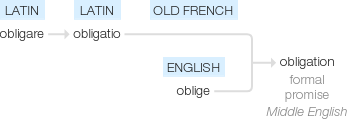Obligation
Middle English (in the sense ‘formal promise’): via Old French from Latin obligatio(n- ), from the verb obligare (see oblige).
wiktionary
From Middle English obligacioun, from Old French obligacion, from Latin obligatio, obligationem, from obligatum (past participle of obligare), from ob-(“to”) + ligare(“to bind”), from Proto-Indo-European *leyǵ-(“to bind”).
etymonline
obligation (n.)
c. 1300, obligacioun, "a binding pledge, commitment to fulfill a promise or meet conditions of a bargain," from Old French obligacion "obligation, duty, responsibility" (early 13c.) and directly from Latin obligationem (nominative obligatio) "an engaging or pledging," literally "a binding" (but rarely used in this sense), noun of action from past-participle stem of obligare "to bind, bind up, bandage," figuratively "put under obligation" (see oblige). The notion is of binding with promises or by law or duty.
The meaning "that which one is bound or obliged to do, especially by moral or legal claims a duty" is from c. 1600. That of "state or fact of being bound or constrained by gratitude to requite benefits, moral indebtedness," also is from c. 1600. Related: Obligational.
